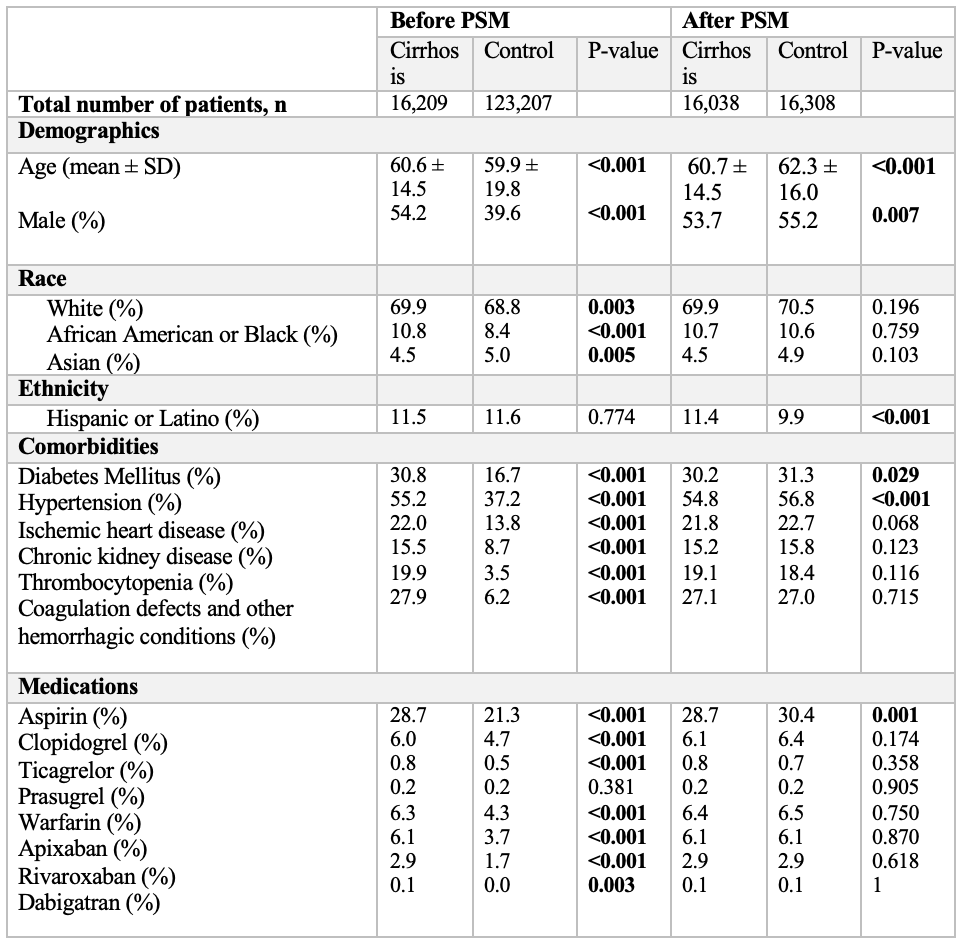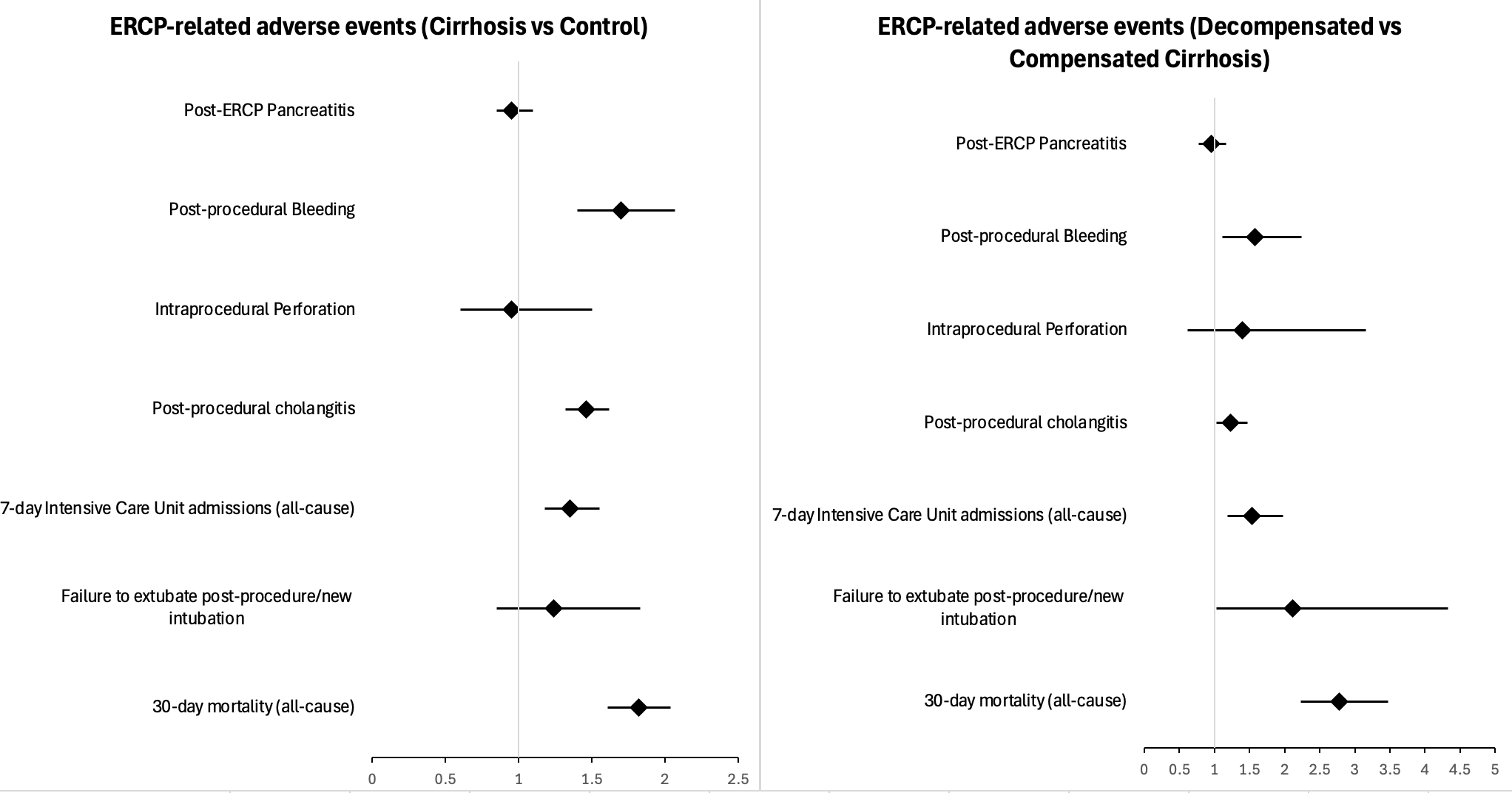Sunday Poster Session
Category: Interventional Endoscopy
P1413 - Cirrhosis Increases the Odds of ERCP Adverse Events but Not Post-ERCP Pancreatitis: A Propensity-Matched Analysis
Sunday, October 26, 2025
3:30 PM - 7:00 PM PDT
Location: Exhibit Hall

Hussein Baydoun, MD (he/him/his)
Indiana University
Indianapolis, IN
Presenting Author(s)
Hussein Baydoun, MD1, Vikram Ram. Rajagopalan, MBBS2, Azizullah Beran, MD2, Daryl Ramai, MD, MPH, MSc3, Indira Bhavsar-Burke, MD4, John Guardiola, MD2, Itegbemie Obaitan, MD, MPH2
1Indiana University, Indianapolis, IN; 2Indiana University School of Medicine, Indianapolis, IN; 3Brigham and Women’s Hospital, Harvard Medical School, Salt Lake City, UT; 4University of Texas Southwestern School of Medicine, Dallas, TX
Introduction: Patients with cirrhosis are at an increased risk choledocholithiasis, requiring intervention with endoscopic retrograde cholangiopancreatography (ERCP). Data on ERCP-related adverse events in this population is limited, hence this study.
Methods: This retrospective cohort study utilized the TriNetX database to assess the odds of ERCP-related adverse events in patients with cirrhosis. Primary outcomes were ERCP-related pancreatitis (PEP), bleeding, cholangitis, and perforation. Secondary outcomes were failure to extubate/new post-procedure intubation, intensive care unit (ICU) admissions, and all-cause mortality. These outcomes were further stratified by cirrhosis severity (compensated and decompensated).
Results: After propensity score matching, each cohort included 16,038 patients (Table 1). Patients with cirrhosis had a higher odd of bleeding (OR 1.7, p< 0.001), cholangitis (OR 1.5, p< 0.001), ICU admissions (OR 1.4, p< 0.001) and mortality (OR 1.8, p< 0.001) following ERCP compared to the matched cohort control (Figure 1). The odds of PEP (OR 0.9, p=0.355), perforation (OR 0.9, p=0.810) and post-procedure intubation (OR 1.2, p=0.267) were statistically similar between the two cohorts. The odds of all ERCP-related events was higher in the decompensated group, except PEP and perforation (Figure 1).
Discussion: Cirrhosis is associated with increased rates of ERCP- related adverse events with the exceptions of post-ERCP pancreatitis and perforation. Stronger associations were seen in the decompensated cirrhosis group leading us to believe that optimizing these patients is crucial prior to performing ERCP. Further prospective research is needed to validate our findings.

Figure: Table 1: Baseline patient characteristics before and after propensity-score matching (PSM)

Figure: Figure 1: ERCP-related adverse events: Primary and secondary outcomes of interest
Disclosures:
Hussein Baydoun indicated no relevant financial relationships.
Vikram Rajagopalan indicated no relevant financial relationships.
Azizullah Beran indicated no relevant financial relationships.
Daryl Ramai indicated no relevant financial relationships.
Indira Bhavsar-Burke indicated no relevant financial relationships.
John Guardiola indicated no relevant financial relationships.
Itegbemie Obaitan indicated no relevant financial relationships.
Hussein Baydoun, MD1, Vikram Ram. Rajagopalan, MBBS2, Azizullah Beran, MD2, Daryl Ramai, MD, MPH, MSc3, Indira Bhavsar-Burke, MD4, John Guardiola, MD2, Itegbemie Obaitan, MD, MPH2. P1413 - Cirrhosis Increases the Odds of ERCP Adverse Events but Not Post-ERCP Pancreatitis: A Propensity-Matched Analysis, ACG 2025 Annual Scientific Meeting Abstracts. Phoenix, AZ: American College of Gastroenterology.
1Indiana University, Indianapolis, IN; 2Indiana University School of Medicine, Indianapolis, IN; 3Brigham and Women’s Hospital, Harvard Medical School, Salt Lake City, UT; 4University of Texas Southwestern School of Medicine, Dallas, TX
Introduction: Patients with cirrhosis are at an increased risk choledocholithiasis, requiring intervention with endoscopic retrograde cholangiopancreatography (ERCP). Data on ERCP-related adverse events in this population is limited, hence this study.
Methods: This retrospective cohort study utilized the TriNetX database to assess the odds of ERCP-related adverse events in patients with cirrhosis. Primary outcomes were ERCP-related pancreatitis (PEP), bleeding, cholangitis, and perforation. Secondary outcomes were failure to extubate/new post-procedure intubation, intensive care unit (ICU) admissions, and all-cause mortality. These outcomes were further stratified by cirrhosis severity (compensated and decompensated).
Results: After propensity score matching, each cohort included 16,038 patients (Table 1). Patients with cirrhosis had a higher odd of bleeding (OR 1.7, p< 0.001), cholangitis (OR 1.5, p< 0.001), ICU admissions (OR 1.4, p< 0.001) and mortality (OR 1.8, p< 0.001) following ERCP compared to the matched cohort control (Figure 1). The odds of PEP (OR 0.9, p=0.355), perforation (OR 0.9, p=0.810) and post-procedure intubation (OR 1.2, p=0.267) were statistically similar between the two cohorts. The odds of all ERCP-related events was higher in the decompensated group, except PEP and perforation (Figure 1).
Discussion: Cirrhosis is associated with increased rates of ERCP- related adverse events with the exceptions of post-ERCP pancreatitis and perforation. Stronger associations were seen in the decompensated cirrhosis group leading us to believe that optimizing these patients is crucial prior to performing ERCP. Further prospective research is needed to validate our findings.

Figure: Table 1: Baseline patient characteristics before and after propensity-score matching (PSM)

Figure: Figure 1: ERCP-related adverse events: Primary and secondary outcomes of interest
Disclosures:
Hussein Baydoun indicated no relevant financial relationships.
Vikram Rajagopalan indicated no relevant financial relationships.
Azizullah Beran indicated no relevant financial relationships.
Daryl Ramai indicated no relevant financial relationships.
Indira Bhavsar-Burke indicated no relevant financial relationships.
John Guardiola indicated no relevant financial relationships.
Itegbemie Obaitan indicated no relevant financial relationships.
Hussein Baydoun, MD1, Vikram Ram. Rajagopalan, MBBS2, Azizullah Beran, MD2, Daryl Ramai, MD, MPH, MSc3, Indira Bhavsar-Burke, MD4, John Guardiola, MD2, Itegbemie Obaitan, MD, MPH2. P1413 - Cirrhosis Increases the Odds of ERCP Adverse Events but Not Post-ERCP Pancreatitis: A Propensity-Matched Analysis, ACG 2025 Annual Scientific Meeting Abstracts. Phoenix, AZ: American College of Gastroenterology.
